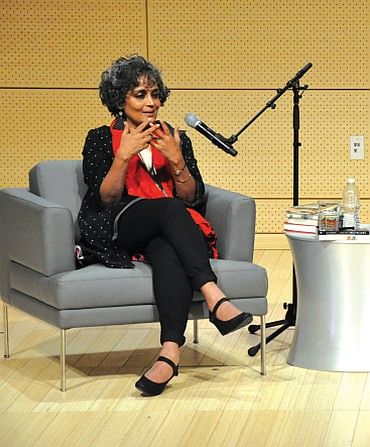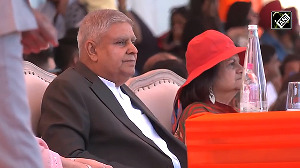'So you have a middle class, and an elite that have seceded into outer space and they look down and say, "What's our bauxite doing in their mountains?" and "What's our water doing in their rivers?" There's a sense of entitlement there.'
Arundhati Roy captures minds with her thoughts on capitalism, Indian politics, war, and more in New York. Rediff.com's Chaya Babu listens in.
 Arundhati Roy, author and political activist, made an appearance in New York last week to discuss her new book for a crowd of eager listeners ready to hear what the writer-turned-activist had to say about her radical perspectives that have won her a place as one of India's most rebellious voices.
Arundhati Roy, author and political activist, made an appearance in New York last week to discuss her new book for a crowd of eager listeners ready to hear what the writer-turned-activist had to say about her radical perspectives that have won her a place as one of India's most rebellious voices.
Capitalism: A Ghost Story is about the ways in which capitalism works in the modern day, which isn't always what we think, she said at the start. "You know, it's not just about corporations and privatisation, but how does it colonise our imagination? How does it tame us? How does it make us into people we don't even know that we are?"
At an event sold out far in advance and moved from its initial location due to the overwhelming response, The New School's John L Tishman Auditorium off Union Square was full but quiet because of an audience rapt with its focus on the 52-year-old soft-spoken woman.
Anyone familiar with her work knows not to be fooled by this softness -- she is strong in her stances, fierce in the presentation of her views, and has garnered many an enemy for making public her criticisms of the world she sees around her.
Though it frequently comes up that Roy hasn't written any fiction since her 1997 Booker Prize winning novel The God of Small Things, she has been vocal non-stop through her non-fiction books and essays about the costs of global capitalism and imperialism, India's military policies toward its own people, the United States' wars on Iraq and Afghanistan, and more.
Even more recently than her newest book, her introduction to an edition of B R Ambedkar's Annihilation of Caste was published just days ago and has already sparked the ire of various groups.
She is harsh on Gandhi and what she sees as his backward approach to caste -- though, she said, "Not as harsh as I should have been" -- and some say she is not in a position to speak on Dalit issues. But she is used to all this.
"In my case, with almost everything I write, for the first six months I have to duck for cover," she said, laughing a little, as she chatted with Siddhartha Deb on the auditorium stage.
Over the two hours that Roy read passages and spoke and answered questions before signing books, she covered a vast topics range of topics.
On what it means when a single corporation has stakes across a wide swath of sectors in India, including the media, while reading from Chapter 1 of Capitalism: A Ghost Story
You have these huge industrialists who have this cross ownership of businesses and then you have these huge media houses, like for example, a newspaper called the Dainik Bhaskar, which has a readership of 17.5 million readers in four languages.
They own 69 companies, which are mining companies, power generation companies, real estate companies, textile companies... you have this kind of way of controlling information and imagination and business and land and agriculture.
On what Prime Minister Manmohan Singh called India's greatest national security threat.
The army is constantly deployed against people who are supposedly within the nation.
And now, because of this new aggressive economic policy, which involves selling the mountains, the rivers, privatising and mining, there is a war going on against indigenous people in the forests of central India.
But the war is not just in the forests; there's a whole bandwidth of resistance movements.
Inside the forests are the armed Maoist guerillas; outside there are militant people's movements.
On how conflicts between the Indian military and indigenous people's resistance to being robbed of their land is impacting the elections
One of the main issues in the election, unstated in some ways, is that the present government, though it tried to do this Operation Greenhunt, it was pushed back by civil society, by activists, by the physical fight in the forest.
So now, the corporations want to back a government that can actually send out the army and the air force against the poorest people in India to hand over those lands to the corporations.
They want someone who is not going to flinch, who is not going to be upset by what happened over the last two years when, in Indian civil society, many people stood up and said, 'You can't do this.' And this government blinked.
So now we are looking for a government that is not going to blink. But obviously this kind of coercion works for the poor -- you can bomb the poor, you can jail them, you can do all of that, but what are you going to do with the others?
On the difference between two rival political parties and Hindu nationalism
If you go back in time to the turn of the 20th century, in the freedom movement, you had two factions in the Congress known as the Naram Dal and the Garam Dal, the militant and the moderate. Now they just happen to be two different political parties, but they are playing out the same trajectory.
So, what the Bharatiya Janata Party sells is Hindu nationalism and the Congress party sells its secularism though actually in fact, like I was saying, since 1947 if you look at these wars that the Indian army has fought -- in Manipur, Nagaland, Punjab, Mizoram, Telangana -- the wars are always fought against 'the other', you know, whether they are Muslims, tribals, Sikhs, Christians, Adivasis.
It is an upper caste Hindu State at war with the other.
On the acceptance of current systems and policies in India
How have countries in the West become industrialised, modernised? That has happened through a history of colonialism, right? A colonialism where raw materials were used to feed the industry. And India doesn't have colonies, so it is colonising itself.
So you have a middle class, and an elite that have seceded into outer space and they look down and say, 'What's our bauxite doing in their mountains?' and 'What's our water doing in their rivers?'
There's a sense of entitlement there. And people have told me openly, 'Look, all these other countries have a history,' and by that they mean a history of committing genocide, 'and someone has to pay the price for progress.' This I have heard told to me many times.
On the backlash she has faced, particularly after her essay Walking with the Comrades
People said, 'In the land of Gandhi, how can you support these people with guns?' and I said, 'Okay tell me: If 1,000 Border Security Forces surround a village of indigenous people and start burning it and raping women and chasing them away, what are they supposed to do?'
I mean can hungry people go on a hunger strike? Can people who don't have any access to TV go around acting Gandhian? They can't. So while, theoretically, in the media and TV studios and academia, people discuss violence and non-violence, it is actually strategic -- I mean the same person can be a Gandhian on the street and a Maoist in the forest. You just have to do what you can do to fight.
On the spirit of those involved in resistance movements
The understanding of what's going on is tremendous among people involved in the resistance movements. This is why I always find it surprising when people say, 'Oh, she's an anti-national.'
I don't think anybody could be prouder of how, with such wisdom, with such courage, with such intelligence, these battles are being waged... and with such profound questioning.
Because it is not just a battle about, 'This is my land and I don't want to leave my home' -- it's really a question that is being asked about the nature of happiness, the nature of what we call civilisation. And that profound question is being posed by people whose bodies are on the line.
On what advice she has for writers
I can't really advise you. But acceptability spells death to a writer.
Image: Arundhati Roy at The New School in Manhattan, New York.











